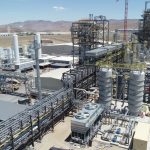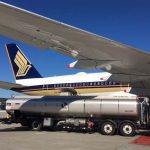Two emerging US producers of sustainable aviation fuel have won significant new support, with Houston-based Cemvita Corporation announcing a 20-year SAF offtake deal from United Airlines, and New York-based DG Fuels securing Airbus as a strategic partner. United, which last year invested in Cemvita, has now committed to acquire 1 billion gallons (almost 3.8 billion litres) of SAF from the company, or up to 50 million gallons (189 million litres) per year. The fuel will be made from recycled carbon dioxide. The Airbus partnership with DG Fuels includes agreement that a portion of the SAF produced at the company’s first plant in Louisiana will be for Airbus customers. DG Fuels will use wind and solar power to produce SAF from cellulosic waste products such as forestry residue. It plans to begin SAF production in 2026.
United’s investment in Cemvita served the dual purpose of increasing renewable fuel pathways and securing the airline’s own long-term supplies of SAF. The Cemvita fuel acquired by United will be produced by using synthetic biology, a method which recreates the natural process of photosynthesis to convert CO2 to non-fossil fuels or chemicals.
“Cemvita’s technology has the potential to provide more reliable feedstock production with minimal land, water and electricity needs,” the company explained. It said output of eCO2 plants had the potential to be carbon-negative, and that Cemvita aimed to be cost-competitive with existing crop-based HEFA (hydro-processed esters and fatty acids) feedstocks and fuels.
“Since our initial investment last year, Cemvita has made outstanding progress, including opening their new pilot plant – an important step towards producing sustainable aviation fuel,” said Michael Leskinen, President of United Airlines Ventures, which invests in like-minded businesses focused on new aviation technologies.
“United is the global leader in SAF production investment,” he said, “but we face a real shortage of available fuel and producers. Cemvita’s technology represents a path forward for a potentially significant supply of SAF and it’s our hope that this offtake agreement for up to 1 billion gallons is just the beginning of our collaboration.”
Moji Karimi, CEO of Cemvita, welcomed the added commitment from United and its role in accelerating the energy transition.
“Biology is capable of truly amazing things,” he said. “This agreement featuring our unique SAF platform is a major milestone towards demonstrating our journey to full commercialisation.”
Neither company specified a timeline for the latest deal.
Like United in its Cemvita investment, the Airbus partnership with DG Fuels is designed to accelerate new production pathways for SAF, and access for its own customers, as demand for the low-emission fuels increases. The partnership – details of which were not disclosed – will also support DG Fuels’ aims by early 2024 to launch the equity process and reach a final investment decision on building its first plant in the US.
“Sustainable aviation fuels play a crucial role in enabling aviation’s decarbonisation roadmap,” said Airbus CEO Guillame Faury. “We are committed to supporting all efforts that contribute to making them available at scale around the globe.
“The partnership with DG Fuels supports the emergence of a new technological pathway, allowing for the production of SAFs from a broader range of waste and residue resources, first in the US, with a potential for large-scale production worldwide.”
Initially, DG Fuels is targeting an average annual production capacity of 120 million gallons (454 million litres), which it estimates could avert 1.5 million tonnes of aircraft CO2 emissions from 2026.
“The DG Fuels team is excited to have finalised this SAF partnership with Airbus. We look forward to working together to accelerate the initial SAF facility in Louisiana and the subsequent scale-up at various locations in the United States and beyond,” said Michael Darcy, Chairman and CEO of DG Fuels.
The two US SAF developments closely follow the release of a new global survey, which found SAF offtake deals in the first seven months of 2023 were less than half the number of deals of the previous year. The study, by energy sector analyst S&P Global Commodity Insights, says policy decisions in Europe and the US have driven a surge of commitments to secure SAF, overtaking supplies promised by fuel producers.
As well, says the report, concerns over the availability of appropriate feedstocks to produce the new fuels have dampened the growth outlook for the SAF sector.
“There was a rush to secure SAF deals in 2021-22 ahead of the introduction of the RefuelEU Aviation package, as airline companies did not want to be left out from the race,” said S&P biofuels analyst Akman Ozel.
And following the Biden Administration’s Inflation Reduction Act, many more investment decisions, offtake agreements and Memorandums of Understanding were signed, added US-based S&P biofuels analyst Jamie Dorner. “Recently, though, it has become clearer that at that rate, offtake agreements were beginning to outpace supply, which has in part contributed to the fever cooling off,” she said.
Photo (Jane Widdowson / Beetroot): Airbus
















More News & Features
Lessons learned from the collapse of Fulcrum BioEnergy
Early data shows uncertainty that UK SAF mandate can be met in its first year
Swiss advanced SAF technology startups Metafuels and Synhelion reach project milestones
PtX fuels have significant Asia-Pacific potential but face many barriers, finds report
Airfreight giants DHL Express and FedEx announce big US SAF deals
Asia-Pacific study reveals pessimistic outlook for SAF uptake by 2030 as Singapore details levy